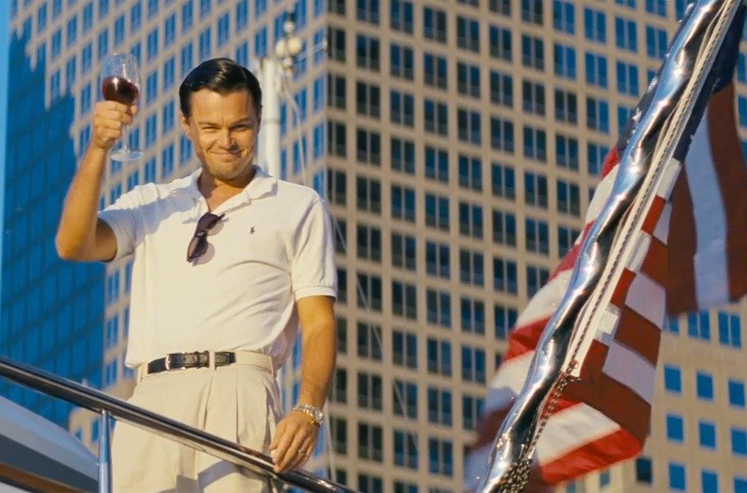The story of Jordan Belfort, the wild head of a stock brokerage who in the 1990s became known as “the wolf of wall street,” has already inspired one film, Boiler Room (2000), which turned the story into a white collar thriller. Perhaps that movie was made too soon. Since then we’ve had the crash of the 2000s, the government bailouts, too big to fail, and the word “derivative swaps” go from backroom Wall Street lingo to its place in the everyday lexicon. In short, what we have seen is the rigging of the American game unveiled, and, coming at the story of Belfort with the luxury of hindsight, Martin Scorsese finds in this character an American anti-hero uniquely appropriate for our time.
Belfort (played with high-vigor in the film by Leonardo DiCaprio) is the epitome of the American Dream on steroids. He’s a kid from Bayside, Queens who attempts to break into Wall Street only to land on his ass after the crash in the early nineties. Turning up at a penny stock brokerage on Long Island, he goes on to create a massively lucratively (and crooked) business. He becomes a Wall Street tycoon with an insatiable appetite for money, drugs, and sex. And much of Scorsese’s film lingers in the midst of the debauchery, challenging our own sense of discretion. Belfort and his cohorts have sex with strippers, smuggle millions of dollars, and ride yachts through raging seas. The most ridiculously and uproarious scene of them all involves DiCaprio and Jonah Hill’s Donnie Azoff, Belfort’s right hand man, ingesting too many Quaaludes, which renders the pair half-paralyzed and helpless. By the scene’s end, DiCaprio is wrapped up in a phone cord while Hill chokes on a crackers. It is as funny as anything Will Ferrell has ever done.
Scorsese takes delight in the luridness of the imagery of spoiled bacchanalia in the same way he let blood spurt gratuitously in Raging Bull or Taxi Driver. It’s a visual challenge, a cocky assertion of the power of the cinema, and a challenge to our feigned morality. With all the humor in Wolf of Wall Street, there is a sinister undertone. In the theater, when the lights go down, we all want to be winners and we all delight vicariously in the thrill of screwing and drinking, shooting and killing. As he has done so many times before with mobsters, he makes us fall in love with this vile, destructive character, the one who is a stand-in for the nihilistic spirit of greed that screwed America. It’s part of the way the movie latches thematically onto the only logical conclusion of an American promise: there is always more to have, and that those who can’t get it are the losers in the only game America’s really got going on.
There are lots of lovable characters in this madness. Matthew McConaughey has all-too short an appearance as Mark Hanna, Belfort’s mentor, and their lunch at a high rise restaurant is one of the most peculiar and captivating scenes of the year. Jonah Hill balances between his Moneyball and This Is the End routines as Belfort’s sidekick, a perverse-minded oddball whose appetite for inebriation fuels his success. Kyle Chandler plays the chilly FBI man, Patrick Denham, whose stoic, straight-laced determination offers the only firm moral ground to stand on. He claims to be the voice of the little guy, the guy on the subway. Belfort, though, challenges him, claiming he is only chasing his own golden goose: the prestige of catching Belfort himself.
Like its main character, The Wolf of Wall Street is something of a mess, starting with a burp, wandering on and on, running through madcap comedic scenes that feel like they belong in a Judd Apatow film, and then screeching to a halt for lingering ensemble performances that call to mind Goodfellas. But The Wolf of Wall Street is pure cinematic audacity, full of vigor, wit, and wild appetite. Scorsese pummels something pertinent and undeniable about the American character with a film that cackles like a mad clown. It’s a subtly scathing and brutal film that feels strikingly prescient, a new Gatsby or a contemporary update to Citizen Kane that replaces the historic-tragic Shakespearian tone with the bawdy, vicious wit of an Aristophanes and the slapstick of a Jacques Tati. The result is a paradox, a film that is as distasteful and shallow as it is endlessly enjoyable and brilliant.






